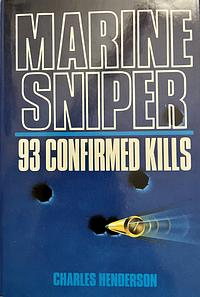You need to sign in or sign up before continuing.
Take a photo of a barcode or cover
5 stars for the bravery of this Marine, during and after his service in the Vietnam War. He was indisputably an outstanding, championship winning shooter and a skilled sniper and brave and selfless warrior, and a man who believed entirely in what he was doing. My hesitations around this book maybe center on (1) the almost Pecos Bill or Paul Bunyan style legendary telling; and (2) some kinda uncritically repeated as fact racist sexist stuff in this book. I have no doubt Mr. Hathcock was a product of his era and upbringing, at least in part -for good and ill-, as evidenced both by his bravery and the confederate flag tattoo he chose to wear. So my 3 star rating goes to that stuff and the way it’s written about in this book.
Great Read
I’ve read a handful of books on the Vietnam War and this one is at the top. It was entertaining and easy to read. The stories kept my interest and the writing was good. I wouldn’t say this book described the war in great depth like some other of the other good ones I’ve read, but instead focused on the sniper’s role in the war and the specific missions that Hathcock was involved. It’s amazing to hear of the stories from arguably the best sniper in US military history.
I’ve read a handful of books on the Vietnam War and this one is at the top. It was entertaining and easy to read. The stories kept my interest and the writing was good. I wouldn’t say this book described the war in great depth like some other of the other good ones I’ve read, but instead focused on the sniper’s role in the war and the specific missions that Hathcock was involved. It’s amazing to hear of the stories from arguably the best sniper in US military history.
The story of Carlos Hathcock, who will probably always be remembered as the most effective sniper in the history of the U.S. Marine Corps. Hathcock fought in Vietnam and, as the title says, killed 93 people that were documented and confirmed, and probably killed hundreds more that were listed as "probable" or "unknown".
Snipers are unusual even among professional military people - they have one of the hardest and most dangerous jobs psychologically, emotionally, and in terms of wide-ranging skills and effort required. Every sniper I've known or heard interviewed has said the same kind of thing about how he or she handled the act of looking at another human being that appeared to be close by (through a scope) but usually didn't even know the sniper was there, then carefully and deliberately shooting and killing that person. Essentially, they all said that they kept reminding themselves that by killing enemy soldiers, they were preventing them from killing the sniper's own friends and comrades, so what they were doing was ultimately saving the lives of people they loved. They also talked about depersonalizing it, deliberately thinking of the people they were shooting as simply targets.
Most seemed to have made peace with what they'd had to do, though some were tormented then and later and a fair number who started out found that they couldn't do the job emotionally.
Hathcock was a hard man to figure out, a bundle of seeming paradoxes. He was a quiet and unassuming man with a huge and sometimes cocky ego; a caring and gentle person who killed a lot of other people without seeming to have problems doing that. I'd recommend this book to anyone who is interested in this aspect of warfare.
Snipers are unusual even among professional military people - they have one of the hardest and most dangerous jobs psychologically, emotionally, and in terms of wide-ranging skills and effort required. Every sniper I've known or heard interviewed has said the same kind of thing about how he or she handled the act of looking at another human being that appeared to be close by (through a scope) but usually didn't even know the sniper was there, then carefully and deliberately shooting and killing that person. Essentially, they all said that they kept reminding themselves that by killing enemy soldiers, they were preventing them from killing the sniper's own friends and comrades, so what they were doing was ultimately saving the lives of people they loved. They also talked about depersonalizing it, deliberately thinking of the people they were shooting as simply targets.
Most seemed to have made peace with what they'd had to do, though some were tormented then and later and a fair number who started out found that they couldn't do the job emotionally.
Hathcock was a hard man to figure out, a bundle of seeming paradoxes. He was a quiet and unassuming man with a huge and sometimes cocky ego; a caring and gentle person who killed a lot of other people without seeming to have problems doing that. I'd recommend this book to anyone who is interested in this aspect of warfare.
fast-paced
Graphic: Death, Gore, Mental illness, Racism, Sexual violence, Torture, Violence, Blood, Medical content, Grief, Medical trauma, War, Injury/Injury detail
Showed things about war I hadn't imagined & things about snipers I never knew. Carlos Hathcock was an amazing guy.
challenging
emotional
informative
slow-paced
Had to read it for Military History in my highschool class so its not what I personally would read for fun but it was an interesting book and if you like military books it was great!
adventurous
dark
emotional
informative
inspiring
tense
fast-paced
adventurous
emotional
informative
inspiring
reflective
medium-paced
emotional
informative
medium-paced
adventurous
dark
tense
medium-paced
Some really amazing stories of the greatest sniper seemingly in Marine history. Hathcock had an amazingly impressive career.




